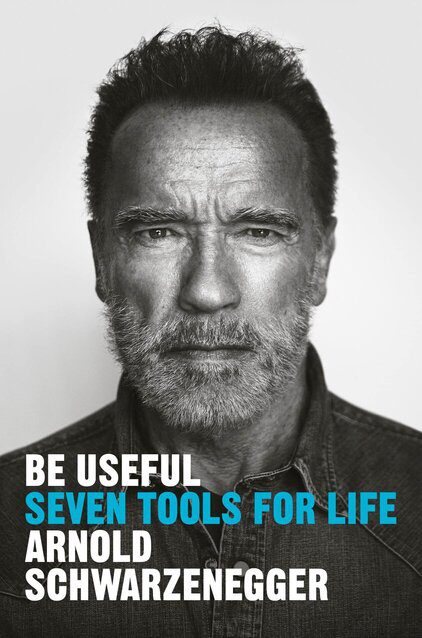Arnold Schwarzenegger has constantly re-invented himself from being the world’s greatest bodybuilder, and highest-paid movie star and later becoming the thirty-eighth governor of California (the world’s sixth-largest economy.). Growing up in Austria, his father constantly encouraged him to be useful. In Be Useful: Seven Tools for Life, Arnold shares seven life principles that have helped him become one of the most recognizable faces in the world and the secret to his extraordinary achievement.
Be Useful
The book is called Be Useful because that is the best piece of advice my father ever gave me. It has stuck in my brain and never left.
Being useful was also the motivating force behind all my decisions, and the organizing force around the tools I used to make them. Being a bodybuilding champion, being a millionaire leading man, being a public servant—those were my goals, but they were not what motivated me.
The purpose of good advice is not to tell you what to build, it’s to show you how to build and why it matters.
All great things start with a clear vision
Vision is the most important thing. Vision is purpose and meaning. To have a clear vision is to have a picture of what you want your life to look like and a plan for how to get there. The people who feel most lost have neither of those. They don’t have the picture or the plan.
You have a choice
None of us has a choice about where we come from. I grew up in a small village in Austria at the beginning of the Cold War. My mother was very loving. My father was strict, and he could be physically abusive, but I loved him very much. It was complicated. I’m sure your story is complicated too. I bet growing up was more difficult than the people around you think it was. We can’t change those stories, but we can choose where we go from there.
“We always have a choice. What we don’t always have, unless we create it, is something to measure our choices against.”
That is what a clear vision gives you: a way to decipher whether a decision is good or bad for you, based on whether it gets you closer or further away from where you want your life to go. Does the picture you have in your mind of your ideal future get blurrier or sharper because of this thing you’re about to do?
Start Broad and Zoom in
For most of us, it’s necessary. Anything more detailed gets too complicated too quickly, and you get ahead of yourself. You start missing important steps on the road map. Having a broad vision gives you an easy, more accessible place to start from when it comes to figuring out where and how to zoom in.
First, create little goals for yourself. Don’t worry about the big, broad stuff for now. Focus on making improvements and banking achievements one day at a time. They can be exercise goals, or nutrition goals. They can be about networking or reading or getting your house organized. Start doing things you like to do or that make you proud of yourself for having completed them. Do those things every day with a little goal attached to them, and then notice how doing that changes what you pay attention to. All of a sudden you will find yourself looking at things differently.
Once you’ve developed a rhythm with those little daily goals, create weekly and then monthly goals. Instead of zooming in from a broad place, build out your life from this small beginning and let your vision open up in front of you from there. As it does, and the sense of uselessness starts to loosen its grip, that’s when you take the second step: put the machines away and create space and time in your life, however small or short in the beginning, for inspiration to find its way in and for the discovery process to happen.
Rule 2: Never Think Small
Wenn schon, denn schon. German for “If you’re going to do something, DO IT. Go all out.
if you’re going to do it, do it. Not just because going all in might be the thing that guarantees your success, but because not going all in will absolutely guarantee that you fall short. And it’s not just you who will suffer as a result.
IGNORE the Naysayers
There will always be people in your life who doubt you and doubt your dream. They will tell you it’s impossible. That you can’t do it or that it can’t be done. The bigger your dream, the more often this will happen, and the more of these people you will meet.
Naysayers are a fact of life. That doesn’t mean they get to have a say in your life. It’s not that they’re bad people. They’re just not very useful to someone like you. They’re scared of the unfamiliar and the unknown. They’re afraid of taking risks and putting themselves out there. They’ve never had the courage to do what you’re trying to do. They’ve never crafted a huge vision for the life they want and then put a plan together to make it a reality. They’ve never gone all in on anything.
When it comes to you and your dreams, the naysayers have no idea what they’re talking about. And if they haven’t done any of the things that you’re trying to do, the question you need to ask yourself is: Why should I ever listen to them? The answer is, you shouldn’t. You should ignore them. Or better yet, hear what they have to say and then use it as motivation.
Nothing good has ever come from having a plan B. Nothing important or life-changing, anyway. Plan B is dangerous to every big dream. It is a plan for failure. If plan A is the road less traveled, if it’s you carving your own path toward the vision you’ve created for your life, then plan B is the path of least resistance.
Rule 3: Work your Ass Off
If there is one unavoidable truth in this world, it’s that there is no substitute for putting in the work. There is no shortcut or growth hack or magic pill that can get you around the hard work of doing your job well, of winning something you care about, or of making your dreams come true. People have tried to cut corners and skip steps in this process for as long as hard work has been hard. Eventually, those people either fall behind or get left in our dust, because working your ass off is the only thing that works 100 percent of the time for 100 percent of the things worth achieving.
Pain is Temporary
That’s the beauty of pain. Not only is it temporary, which means you don’t have to deal with it forever, it tells you whether you’ve begun to give enough of yourself in pursuit of your dreams. If the work of being great or achieving something special hasn’t hurt or cost you anything, or at least made you uncomfortable, then I’m sorry to be the one to tell you, but you’re not working hard enough. You’re not sacrificing all that could be sacrificed in order to be all that you could become.
To do great things that last, sacrifices are necessary.
Rule 4: Sell, Sell, Sell
Know Your Customer
Selling your vision means being open about what you’re trying to achieve and telling your story in such a way that it is perceived in the most positive light possible by the people you need or want to get a yes from. Your customers, in other words.
You can never take for granted that you know who your customer is. It’s not always obvious who you need to move toward a yes and who you need to move away from a no. Unless you pay attention to who is paying attention to you, it’s impossible to know for sure who your vision is attracting positively or who it might be impacting negatively.
A big part of selling your vision is seeing how the world around you reacts to what you’re trying to do. It’s how you figure out who wants to say yes and who you need to say yes. If you can do that, you will know who all your customers are before they even know that you’re selling to them.
Rule 5: Shift Gears
You work is to make a dream come true, you don’t whine it into existence. Plus, problems and adversity are a normal part of every person’s journey. Whatever your vision is, there is going to be struggle. Tough times. Things that bug the shit out of you. You have to learn how to manage those moments. You have to get good at shifting gears and finding the positive in things. You have to know how to reframe the failure you experience and understand the risks you’re undertaking. Confronting problems instead of complaining about them gives you the chance to practice all these skills.
Risk is relative
Risk is just the name we give to the conclusion that each one of us comes to independently when we evaluate a choice for its chances of success compared to the consequences of its failure. If you believe that something is highly unlikely to succeed and that the consequences for failure are hugely negative, then you will probably conclude that the choice is pretty risky. If the opposite is true—that success is likely and failure wouldn’t be very costly—then the choice probably doesn’t seem risky at all.
Rule 6: Shut your mouth, open your mind
Be a sponge
Being curious and being a good listener are a big part of how to effectively utilize your relationships with other people in pursuit of your goals. When it comes down to it, people are resources. But it’s only when you learn to soak up what those people tell you—not just let it go in one ear, out the other—that you truly begin to make yourself useful to others and become a resource yourself.
Rule 7: Break your Mirrors
Helpers High
Giving back is also known to produce a neurochemical called vasopressin, which is associated with love. In fact, just thinking about or remembering moments of being charitable triggers the release of these same hormones.
Social scientists have a name for this phenomenon: they call it “helper’s high.” That’s how powerful giving back is. It’s a natural feel-good drug with highly addictive properties.
This is just what happens when giving back gets its hooks into you. Like a drug, you don’t just want to do more of it, you want to go bigger too. You want to help more people, more often, with more things.
All the best in your quest to get better. Don’t Settle: Live with Passion.



Comments are closed.